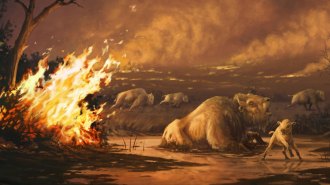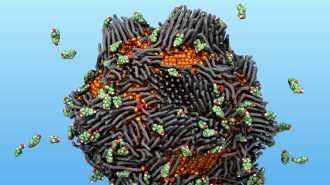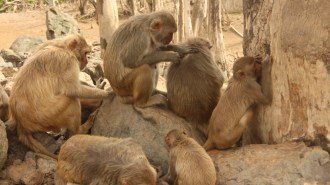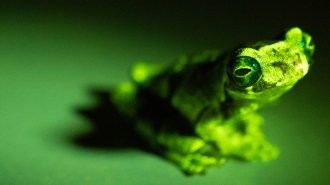Uncategorized
-
 Astronomy
AstronomyJWST’s hunt for distant galaxies keeps turning up surprises
In its first year, the James Webb Space Telescope has found many galaxies from the early universe that are bigger, brighter and more mature than expected.
-

A key technology could transform the power grid
Editor in chief Nancy Shute discusses ways to upgrade power grids to be more climate friendly.
By Nancy Shute -
 Space
SpaceRecoiling black holes could move at nearly one-tenth the speed of light
Knowing black holes’ speed after being kicked by gravitational waves can reveal how much energy converging black holes can release.
By Nikk Ogasa -
 Life
LifeAround 13,000 years ago, humans and fire changed LA’s ecosystem forever
Rapid drying combined with human-made fires changed Southern California forever, killing off ancient bison, dire wolves and five other megafauna species there.
By Jake Buehler -
 Genetics
GeneticsA new look at Ötzi the Iceman’s DNA reveals new ancestry and other surprises
Ötzi had genetic variants for male-pattern baldness and dark skin, and he also had an unusual amount of early farmer ancestry, a new DNA analysis finds.
-
 Chemistry
ChemistryMagnetic ‘rusty’ nanoparticles pull estrogen out of water
Iron oxide particles adorned with “sticky” molecules trap estrogen in water, possibly limiting the hormone’s harmful effects on aquatic life.
By Skyler Ware -
 Physics
PhysicsHow to run a marathon in under two hours
Running between other people reduces air resistance. A new study identifies optimal positioning of such drafting formations. Watch out, marathon records.
-
 Neuroscience
NeuroscienceNeuroscientists decoded a Pink Floyd song using people’s brain activity
The technique could be used to improve devices that allow communication from people unable to speak.
-
 Animals
AnimalsMacaques in Puerto Rico learned to share shade after Hurricane Maria
Animals that spent more time together on hot afternoons were less likely to die during the years following the storm, a new study finds.
-
 Health & Medicine
Health & MedicineWhy are more people under 50 getting colorectal cancer? Scientists have some clues
Science News spoke with doctors about their research into early-onset colorectal cancer. Here’s what they’re learning and what questions remain.
By Meghan Rosen -
 Life
LifeMany frogs glow in blue light, and it may be a secret, eerie language
Biofluorescence is far more common across frog species than previously thought. The faint twilight glow could have a role in communication or mating.
By Jake Buehler -
 Climate
ClimateNature’s changing colors makes climate change visible
The world’s color palette is shifting in response to climate change. Seeing these changes in nature firsthand is a powerful communication tool.
By Sujata Gupta